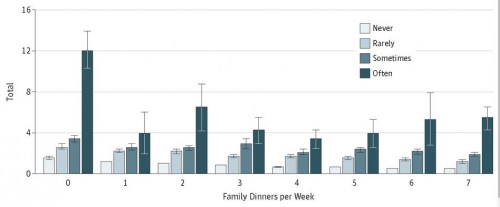From JAMA Pediatrics, “Cyberbullying Victimization and Mental Health in Adolescents and the Moderating Role of Family Dinners“:
Importance: This study presents evidence that cyberbullying victimization relates to internalizing, externalizing, and substance use problems in adolescents and that the frequency of family dinners attenuate these associations.
Objectives: To examine the unique association between cyberbullying victimization and adolescent mental health (after controlling differences in involvement in traditional, face-to-face bullying) and to explore the potential moderating role of family contact in this association.
Design, Setting, and Participants: This cross-sectional, observational study used survey data on 18 834 students (aged 12-18 years) from 49 schools in a Midwestern US state. Logistic regression analysis tested associations between cyberbullying victimization and the likelihood of mental health and substance use problems. Negative binomial regression analysis tested direct and synergistic contributions of cyberbullying victimization and family dinners on the rates of mental health and substance use problems.
Exposures: Frequency of cyberbullying victimization during the previous 12 months; victimization by traditional (face-to-face) bullying; and perpetration of traditional bullying.
Main Outcomes and Measures: Five internalizing mental health problems (anxiety, depression, self-harm, suicide ideation, and suicide attempt), 2 externalizing problems (fighting and vandalism), and 4 substance use problems (frequent alcohol use, frequent binge drinking, prescription drug misuse, and over-the-counter drug misuse).
This was a large cohort study of almost 19,000 students. First, researchers looked for associations between being cyberbullied and mental health or substance use problems. Then they looked at whether family dinners had any effect on this relationship. The main exposure was being a victim or cyberbullying. The main outcomes were issues like anxiety, depression, self-harm, suicidal ideation or attempts, fighing, vandalism, frequent alcohol use, binge drinking, and misuse of over-the-counter or prescription drugs.
Sadly, about 19% of these students had been a victim of cyberbullying in the last year. Unsurprisingly, the frequency of cyberbullying was associated with all of the bad outcomes of interest.
The good news was that this association was somewhat blunted for adolescents that had more family dinners:
What you’re looking at here are the total numbers of problems by rates of being cyberbullied (never, rarely, sometimes, often). You can see that by 4 family dinners per week, the difference in problems between those levels of cyberbullying was much less than that for no family dinners per week. In other words, family dinners appear to make cyberbullying less likely to cause a problem.
This isn’t the first time that family meals have been shown to be a good thing. But do we really need a study to know that? Could there possibly be a downside?


